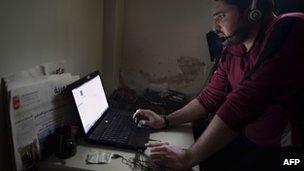Syria 'cut off from the internet'
- Published

The cause of the latest internet outage in Syria is not known
Internet services have halted across Syria, in what appears to be the second shutdown in six months.
Web monitoring companies reported regular traffic on the internet plummeted to zero just before 19:00 GMT on Tuesday (22:00 local time).
Syria last experienced a shutdown for three days last November.
The Syrian government blamed that incident on "terrorists", but internet experts said it was more likely that the regime had shut down the web.
President Bashar al-Assad's government has been fighting a bloody internal conflict for two years.
Activists suggested at the time of the last internet shutdown that the regime might have been planning a major offensive, or that it might have been attempting to disrupt rebel communications.
However, neither theory was substantiated.
US web companies, including Renesys and Akamai, logged the latest blackout late on Tuesday.
'Deliberate attempt to silence'
Jim Cowie, of Renesys, told the BBC there was not enough information to tell what had caused the latest blackout.
"It seems to be very similar in terms of the dynamic to the event that took place last November in that the routes to the Syrian internet were withdrawn very suddenly and all together, almost like a switch being thrown," he said.
"One can always speculate about whether it is infrastructure damage, or power outage at a critical facility, or simply someone deciding to turn off the internet."
Syrian residents confirmed the blackout, but said mobile phones and landlines were working normally.
A digital rights campaign group, the Electronic Frontier Foundation, said the internet was a vital resource for activists in the country.
"We're deeply concerned that this blackout is a deliberate attempt to silence Syria's online communications and further draw a curtain over grave events currently unfolding on the ground in Syria," it said in a statement.
"While heavily censored, monitored and compromised, the internet has served as an important window connecting the world at large to Syria, and one way that international observers could connect with individuals on the ground in that country.
"A number of activists on the ground in Syria have access to internet via satellite links, which can connect them to the internet but carries a high risk for detection, which can be life-threatening."